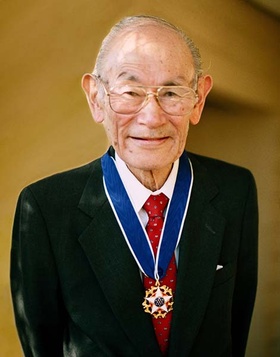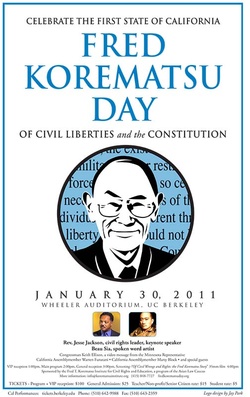January 30 marks a historic occasion. That day, we will celebrate California’s first Fred Korematsu Day, the first day in the US named after an Asian American. Like other such days, this milestone has been a long time coming.
In 1983, President Ronald Reagan signed the Martin Luther King, Jr. Day federal holiday into law, but only after six million petition signatures had pressured Congress to pass the bill. In 1997, the state of Michigan became the first state to sign into law Rosa Parks Day, to be celebrated on the first Monday following February 4, Mrs. Parks’ birthday. In 2000, California became the first of eight states to pass a Cesar Chavez Day, and in 2009, California became the first and only state to pass Harvey Milk Day.
With Fred Korematsu Day, the Golden State has once again taken the lead in recognizing a national civil rights hero. The law, Assembly Bill 1775, was signed by former governor Arnold Schwarzenegger last September after passing with unanimous votes in both the state assembly and state senate. The Fred Korematsu Day bill encourages schools across the state to teach Korematsu’s story and its relevance today.
During World War II, Korematsu was a 23-year-old welder in Oakland, California who defied military orders that ultimately led to the evacuation and incarceration of 120,000 Japanese Americans. After he was arrested and convicted of defying the military’s incarceration order, he took his case to the U.S. Supreme Court, which in 1944 upheld his conviction on the ground that the forced removal of Japanese Americans was justified due to “military necessity.” That decision has been widely condemned as one of the darkest chapters in American legal history.
After four decades of having to live with a “disloyalty” conviction on his record that limited him from securing full-time work, Korematsu filed suit to reopen his case on proof that the government, when arguing his case during the war, had suppressed, altered, and destroyed material evidence that contradicted the government’s claim of military necessity. In 1983, the Federal District Court for the Northern District of California granted his petition for a writ of error coram nobis (a notice of error) and overturned his conviction. It was a pivotal moment in civil rights history that helped lead to the Civil Liberties Act of 1988, whereby the U.S. Government paid $20,000 to each survivor of the Japanese American incarceration camps.
To give educators the resources to teach this important story, the Korematsu Institute developed and distributed hundreds of free Korematsu teaching kits to K-12 classrooms around the state earlier this month. Kits were shipped as far north as McKinleyville, CA, which is north of Eureka, and Chula Vista, CA, near the Mexican border. Each kit included a K-12 Korematsu Teacher’s Guide, complete with lesson plans and suggested activities, multiple videos as well as bookmarks and a Fred Korematsu Day poster.
Most teachers will use our materials in the days and weeks after January 30, which falls on a Sunday, but I already have an idea of how the Korematsu story will resonate with young students. Last fall, I and Karen Korematsu, Fred Korematsu’s daughter, visited McKinley Elementary School in San Leandro, CA. Students had a host of questions for Karen. Some asked for details about the Presidential Medal of Freedom Fred Korematsu received from President Bill Clinton in 1998. Others were curious to know how old Fred was when he defied the US government order to report to the Japanese American incarceration camps (answer: just 23 years old!). Still others wondered if they would be brave enough to do what Fred Korematsu did.
It’s incredibly exciting to imagine how Korematsu’s legacy will impact the way students interact with each other, and hopefully, help stand up for each other. The teaching kits we sent out before the first Fred Korematsu Day mark the beginning of a thrilling journey we’re taking to expose as many students as possible to the critical concept of defending your own rights as well as the rights of those around you. This January 30, we have a great deal to celebrate!
* * *
ABOUT THE FRED T. KOREMATSU INSTITUTE
The Fred T. Korematsu Institute for Civil Rights and Education is a program of the Asian Law Caucus, the nation’s first legal and civil rights organization serving low-income Asian Pacific American communities. The Korematsu Institute’s mission is to advance pan-ethnic civil rights and human rights through education, activism and leadership development. In 1983-1984, the Asian Law Caucus was a key member of the legal team that helped overturn Korematsu’s 1944 conviction for refusing to obey the Japanese American incarceration orders. The Asian Law Caucus, together with Karen Korematsu, the daughter of Fred Korematsu, co-founded the Korematsu Institute on April 30, 2009 to commemorate the 25th anniversary of the reversal of Korematsu’s conviction.
* * *
2011 FRED KOREMATSU DAY EVENTS
Korematsu Institute’s Fred Korematsu Day Celebration
Sunday Jan. 30, 2011 at Wheeler auditorium, UC Berkeley campus
VIP reception: 1-2 PM; main program: 2-3 PM; General reception: 3-4 PM; Screening of the Emmy Award-winning film Of Civil Wrongs and Rights: the Fred Korematsu Story: 4-5 PM
Program to feature keynote speaker Rev. Jesse Jackson, Beau Sia, Def Poetry Jam spoken word artist, Assemblymembers Warren Furutani and Marty Block, co-sponsors of the Fred Korematsu Day bill, and Karen Korematsu, daughter of Fred Korematsu.
For more info: fredkorematsuday.org. Tickets: tickets.berkeley.edu or call 510.642.9988.
© 2011 Ling Woo Liu




